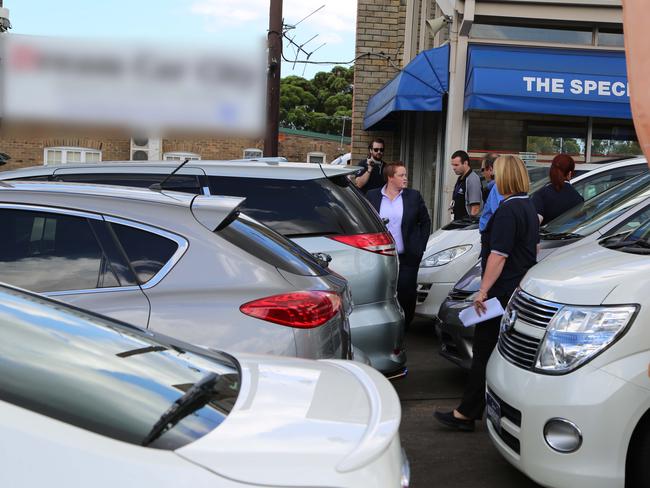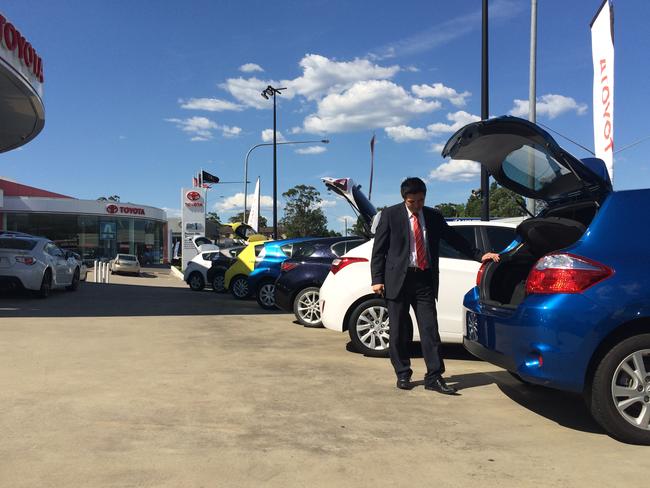How car companies are changing to try and appeal to women
ASK any woman what happened the last time she got her car serviced and chances are she won’t have many positive things to say. Here’s how car companies are trying to change.

USUALLY when women walk into a shop, we try our very best to avoid being bombarded by overly helpful, perky sales assistants.
We’ve come to expect this treatment from retailers, who do everything they can to earn a slice of our growing disposable incomes.
But walking into a car dealership is a completely different experience. Most of the staff are men — who often fail to initiate a conversation — and when asked a daft question about wheel alignment act as though you’ve demanded they hand over their first-born.
Ask any woman what happened the last time she got her car serviced and you’ll hear words like “d***head”, “blank stare” and “disempowered”.
“When I bought my car I got treated like a dumb blonde,” a friend told me when I asked about her experience when buying her new ride.
“I went to pick it up and the guy was so patronising he even showed me how to wind down the electric windows and move the side mirrors!”
Others confessed they always bring their boyfriend or father along and let them do the talking.
“One of my friends bought a car and was talking about the cost and the guy told her she should call her boyfriend or her dad,” a colleague said.
But just as McDonald’s recognises people are turning away from fast food (remember the ‘How very UnMcDonald’s’ ads?), car companies now realise women don’t enjoy the experience of buying a car. And they’re trying to change.

This week a targeted Facebook ad for Holden appeared in my newsfeed.
“Going into a dealership can sometimes I feel, maybe, as a woman, be a little bit intimidating. It’s a bit of a boy’s club,” a funky blonde woman said to camera.
Another woman a pretty brunette, said: “I feel like the car industry portrays women quite unfairly. You always see a man driving the car in the adverts. I feel like it doesn’t really represent who I am as a woman.”
The commercial ended with the tagline ‘Change is coming’ and Holden’s new car aimed at women, the Spark, flashed across my screen.
The ad is accompanied with a statistic: “87 per cent of women feel misunderstood by the car industry”.
That figure comes from a 2014 poll of 400 women by PureProfile on the automotive industry. The results weren’t flattering.
“A lot of [the survey feedback] was around the fact that the auto industry seems to stereotype women and probably doesn’t talk to them in a real and honest way,” Holden’s head of marketing, Teresa Basile, told news.com.au.
“Women have a huge influence on the car purchasing decision, whether it’s for themselves or with their partner. We are pretty well known for being a masculine brand. We’re trying to change our image ... we want to be relevant.”

Consumer behaviour analyst Barry Urq, who is hired by car manufacturers and teaches them how to connect with customers, says although 52 per cent of Australian drivers are women, they can influence up to 70 per cent of all car purchases. (Anyone woman who has talked their partner out of buying an electric blue ute can relate).
“Women are influenced by the buying experience and the ambience,” Mr Urq said.
“If you look at dealerships now they’re very female friendly. They’ve got coffee machines, there are lounge chairs, it’s a nice space.”
Holden is introducing pop-up stores in metropolitan shopping centres where women can browse different cars and ask questions, without feeling the pressure to make a decision right away.
“The people at the pop-up store can connect the customer with the dealership to bridge that gap and make it less intimidating,” said Holden’s senior marketing manager, Bianca Mumdy. They’ve even partnered with Gelato Messina to create their own flavour.

Every car company has vehicles targeted specifically towards women. For Ford it’s the Focus and Fiesta. (Interestingly, although 88 per cent of Ford Ranger buyers are male, the female buy pattern is still similar).
“We’re putting a lot of work into changing the culture at Ford and the dealerships,” a spokesman said.
“For example, we have non-sales-oriented concierges to welcome customers to a dealership and ask them how they’d like to engage with the sales staff.”
Toyota didn’t respond to requests for comment. The Toyota Corolla is the most popular car in Australia, followed by the Mazda 3.
Australian car companies are putting big dollars behind marketing and in-store experiences aimed at women.
Ms Basile confirmed Holden has put a significant amount of money into advertising the Spark on social media and digital channels, and will soon launch commercials on television.
Let’s hope that investment means women will receive fewer blank stares and judgmental looks, as car salesmen realise it pays to be nice to the person with the credit card.



